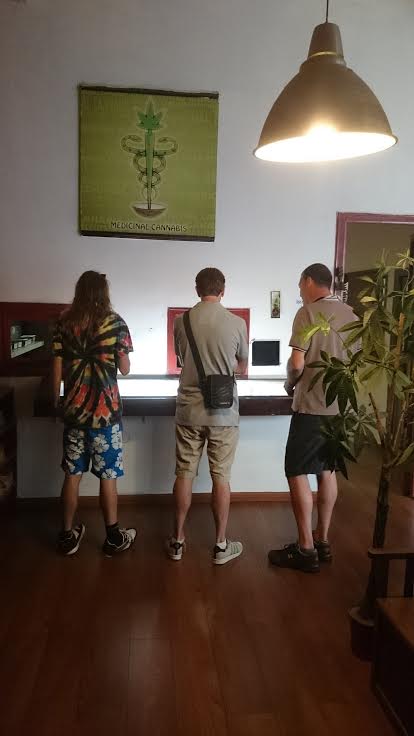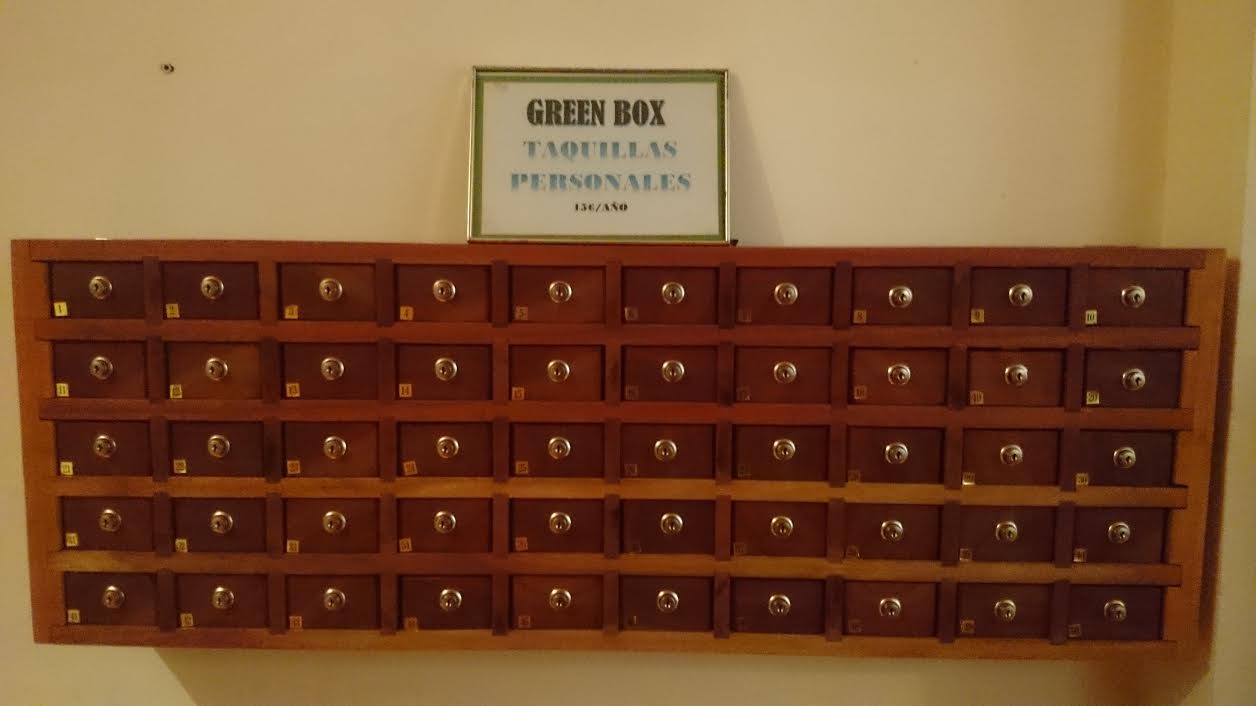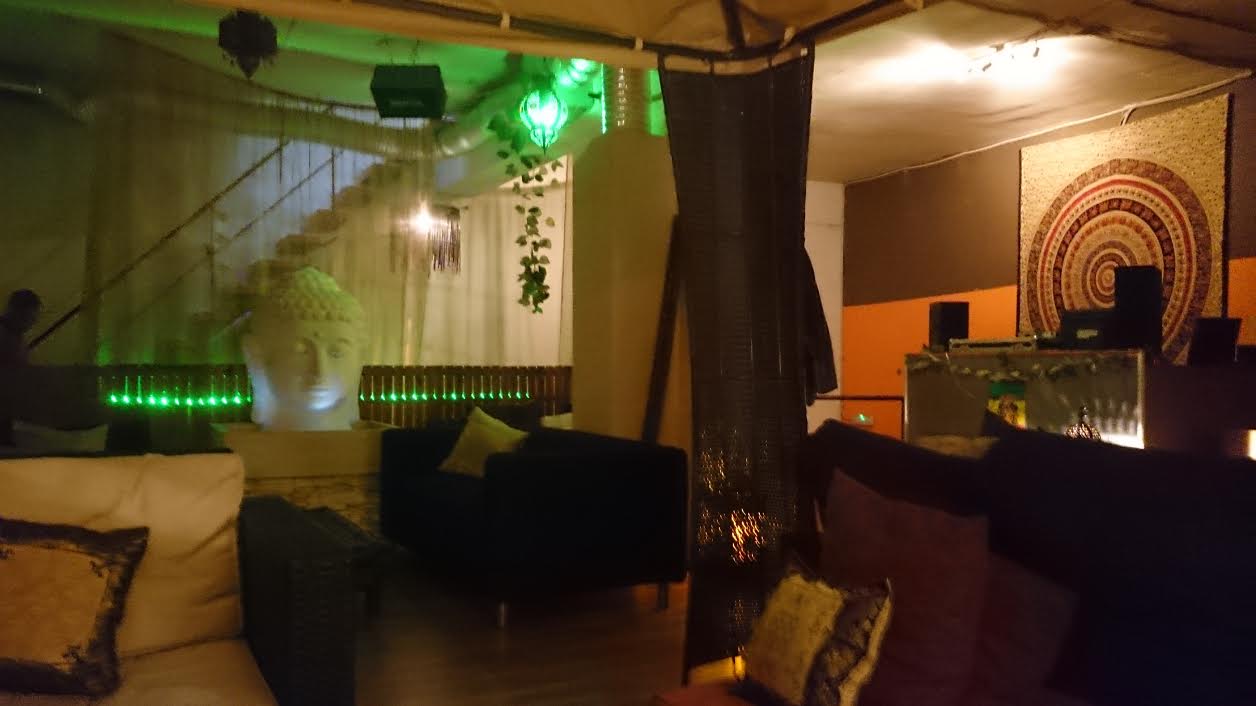The word has really spread. Barcelona has become home to between 300-400 private cannabis social clubs in fewer than 5 years. It’s not obvious to those that aren’t in the know, generally the tourists visiting the city for its history, architecture and warm welcoming culture aren’t affected or offended by the current situation. The cannabis social clubs are quite discreet. Most entrances simply have a small logo next to the camera buzzer.
 Some are a little braver but never in your face. “If you know… you know,” says The Resin Club founder, Jaime, of the brightly coloured trichome macro shot that fills the club’s front window. At no point was there a predictable cannabis leaf drawing attention to a club entrance. And that’s because these aren’t the coffeeshops that cannabis tourists can just turn up to like they have been used to in the Netherlands since the mid 1970’s.
Some are a little braver but never in your face. “If you know… you know,” says The Resin Club founder, Jaime, of the brightly coloured trichome macro shot that fills the club’s front window. At no point was there a predictable cannabis leaf drawing attention to a club entrance. And that’s because these aren’t the coffeeshops that cannabis tourists can just turn up to like they have been used to in the Netherlands since the mid 1970’s.
This is actually something that the CSC’s have made an effort to stay away from and yet it is what is still jeopardising the whole model and international social experiment. No advertising, must be a cannabis user already plus a friend of a member to join, over 18 years old and run not for profit. The CSC’s are private member clubs that sprang out of the desire to have good quality cannabis at a fair and affordable price – the need for a club house quickly evolved out of this.
There is a real community and family spirit within these associations and that was truly felt whilst visiting a number of them. There is still quite a large gray area where the clubs are tolerated due to them operating on private property, something that’s protected under the Spanish constitution, but there is still no regulation to make sure they are acting within the intended ethos of a cannabis association. From the outside K-Lite Association looked like it could be a gym.
Established in 2011 with around 4,000 members it caters to a variety of needs in terms of a wide range of flowers, hashes, oils and edibles but also different social settings to relax in. The attention to detail with the menu, preparation and service was the most refreshing sight to witness when compared with the experience the same kind of cannabis consumers in the UK would have to go through to get not even half as good of a deal or quality of product. Instead of the transaction leaving a feeling of resentment, members know exactly where their money is going; club facility with carbon filtered extraction, staff, garden and product. For €20 members could collect between two and four grams depending on the variety. Compare that to your average 1.4g for £20 in the UK where 90% of the time the quality won’t even come close.

A club operating for its members will know how many members it has active and knows what level of product they need to fulfill the membership agreement each month, they’ll stop taking members if they can’t produce enough. Their in-house extract artist said, “You can’t leave your members short just because you wanted to take on more.”
Seeing clubs under a year old with nearly 10,000 members indicates that the club is likely running as a for-profit business and using tourists looking to see the hidden away cannabis scene as its means. There seems to be a market for them though and in prohibition times if an opportunity presents itself those willing enough to take the risk will. Anyone can apply for a license and open one and run it like a coffeeshop charging €20 a gram because the product is bought from home growers or other sources (essentially keeping the black market alive) – still charging upwards of €50 for membership. There are even existing club licenses currently available to buy from between €200,000 and €500,000.
Just this July (2014) a climax was reached where such clubs taking advantage of the grey area were printing up flyers and hiring promoters to go out on La Ramblas and other tourist traps in the city and try to bring in anyone and everyone they could. It certainly wasn’t a welcome move by clubs that functioned as non-profit and for the members when the authorities decided to come in and inspect half of the clubs, shutting 50 down for exploitation, although seemingly with no real legal repercussions. Clubs not running for residents are accumulating large memberships very quickly via tourists. This means they can grow the maximum amount for each member with no one there to use it which has raised concerns that these associations are being used as a front to grow large quantities in Spain to be trafficked out of the country, breaking the closed cycle model that the clubs were intended to run under – the model that makes them acceptable and which the UN haven’t no-no’d yet, semi-confirming that they don’t break international conventions on narcotics.
When caught in the UK it’s the person that is acting against the law, in Spain it is the cannabis which is illegal. You will get up to €1000 fine (but no criminal record) if found in possession on the streets, but due to the constitutional right to privacy in your own home if the police knocked on your door and you answered it smoking a joint they wouldn’t have the right to arrest you or enter your property because of it. The police have to get a warrant to search your private area, which extends to your private parts so this is where most people are told to keep cannabis if they are leaving a club with it. Police have been known to sit outside some clubs and pick out people leaving on their own. Each club president was very upfront about their concerns for member’s safety.  The Resin Club offers a locker service for its members so they can leave their cannabis stored away safely if anyone is worried about being stopped by a police officer on the street. When the authorities inspected their club house (and raided it several times back in the early days when they were pushing the boundaries of social cannabis norms) they commended them for it. It reduces harm and risk to the members in a legal sense.
The Resin Club offers a locker service for its members so they can leave their cannabis stored away safely if anyone is worried about being stopped by a police officer on the street. When the authorities inspected their club house (and raided it several times back in the early days when they were pushing the boundaries of social cannabis norms) they commended them for it. It reduces harm and risk to the members in a legal sense.
What has taken place at The Resin Club has been a very organic process. By adding on a small extra cost onto their shared cannabis they saved enough for a club house. Although it has three floors they started out by just using the top floor, it was very basic with an assortment of different seating and a small menu of a few kinds of flowers and a couple of hashes. Eventually they started to grow in the basement but were raided and told they could not grow on the same premises and had to move their garden. They were arrested and held in the cells for a day but it didn’t stop them and they carried on straight away. Since then they have made use of all three floors, the top floor, open all day, is now café-like with comfy seating and tables. After 5pm the downstairs opens up which can be a bit more personal when it’s only occupied by a few but is also the perfect social setting for an evening with weed, wine, and a DJ spinning some tunes to set the mood.
Th e basement was now home to a gaming area with pool, table tennis and computer games. Not unlike many parts of the UK, Spain was left with many empty buildings and commercial spaces during the recession. And just like in Colorado and California, Barcelona’s cannabis organisations and businesses have filled the void and put money back into the real estate industry and are maintaining buildings that would otherwise start to deteriorate.
e basement was now home to a gaming area with pool, table tennis and computer games. Not unlike many parts of the UK, Spain was left with many empty buildings and commercial spaces during the recession. And just like in Colorado and California, Barcelona’s cannabis organisations and businesses have filled the void and put money back into the real estate industry and are maintaining buildings that would otherwise start to deteriorate.
The one thing that the city and council authorities have stipulated in their rules for cannabis social clubs is health and safety. They must scrub extracted air through carbon filters and pump it out the back or roof of the building, not onto the street; must have disabled access and facilities; and have fire extinguishers – but only if your club takes up 190 square meters or more. Things aren’t perfect for the cannabis consumers of Barcelona, police shake downs can still happen at any time, either on your person or on your club, but the fact that people can join a club, get safer access to safer quality cannabis that some clubs even show you the tested cannabinoid profiles of is a huge step in the right direction.
The recent crackdown may send a signal that the freedom for commercial clubs to open is coming to an end, no more licenses are being given out in Barcelona currently and a process has started to write a first set of regulations for the clubs which a Federation of Cannabis Associations is working with local authorities on to ensure that it is done in the right way. Not all the existing CSC’s have been investigated yet so more closures could be seen in the future when that takes place. Whatever the case it is interesting to see this new cannabis culture refining itself and offering an insight into one of the likely ways that cannabis will become available to consumers in the UK.

As I was grabbing a last bite to eat before heading to the airport I sat down at a table outside a café opposite a blank door. I joked to my friend that it would make a great inconspicuous entrance to a private club. Soon after someone went to the door and got buzzed in and came out shortly after. And again. And again. I asked one guy that came out if it was a cannabis association and he confirmed. We ate our food and buzzed at the door, explained who we were and asked if we could have a quick tour. Just as Jaime had said to us earlier, “if you know, you know”.
If this is something that you think you are ready to make happen in the UK there really is no need to try and start from scratch and think of a way to do it, this community model has been in practice for 15 years and has worked out many of the problems that have come up. Learning from this legacy and continuing on from it will be the best way to start. The UKCSC has put together a set of guidelines for those already undertaking a membership collective or those prepared to start one. This is in no way legal or a get out of jail free card but merely advice for operating in a transparent way to the members in the interest of fairness, reducing the legal harms by adhering to plant limits, and maintaining a strictly non-profit position so as to attempt to distance the club from the status of criminal enterprise.
Please visit our full UK club list to find your nearest club. Find us on Facebook and Twitter for more news and events acrostic UK cannabis culture.





Comment (1)